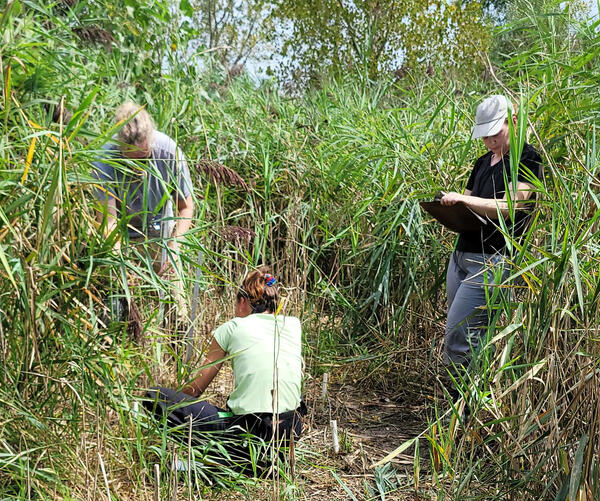USGS scientists (GLSC; Ann Arbor, Michigan) assess the health of invasive Phragmites australis that was treated with a naturally derived herbicide. Photo Credit: Spenser Widin, USGS - GLSC.
Spenser Widin, M.S.
Spenser Widin is a Biologist based in Ann Arbor, MI.
Spenser Widin is a Biologist a working to develop new invasive species control methods. Currently he is conducting laboratory, greenhouse and field studies to develop a non-toxic bioherbicide treatment for a non-native wetland plant, Phragmites australis (common reed).
Professional Experience
Biologist, Restoration and Conservation Science Branch, USGS - Great Lakes Science Center | 06/2022 to Present
Education and Certifications
M.S. (Conservation Ecology), University of Michigan
B.S. (Field and Wildlife Biology), California Polytechnic State University
Single Subject Teaching Credential (Life Sciences), California Polytechnic State University
Abstracts and Presentations
2023. Widin, S.L. and Kowalski, K.P. Targeting Plant-Microbe Interactions: Continued Development and Testing of an Alternative Phragmites Management Strategy. Michigan Wetlands Association Annual Conference, Kalamazoo, MI.
2022. Widin, S.L. et al. Phragmites australis Management During High Water Levels in the Laurentian Great Lakes. Joint Aquatic Sciences Annual Meeting, Grand Rapids, MI.
Science and Products
2022-2023 Phragmites australis Cut-to-drown Field Experiment Data in the Great Lakes Region 2022-2023 Phragmites australis Cut-to-drown Field Experiment Data in the Great Lakes Region
Field Site Locations from Phragmites Bioherbicide 2024 Field Experiment in Southeast Michigan Field Site Locations from Phragmites Bioherbicide 2024 Field Experiment in Southeast Michigan
Field Site Locations from Phragmites Bioherbicide 2023 Field Experiment in Southeast Michigan Field Site Locations from Phragmites Bioherbicide 2023 Field Experiment in Southeast Michigan
2021 USGS Phragmites australis Greenhouse Submergence Experiment Data conducted in Ann Arbor, MI 2021 USGS Phragmites australis Greenhouse Submergence Experiment Data conducted in Ann Arbor, MI
USGS scientists (GLSC; Ann Arbor, Michigan) assess the health of invasive Phragmites australis that was treated with a naturally derived herbicide. Photo Credit: Spenser Widin, USGS - GLSC.
A pair of differential grasshoppers (Mellanoplus differentialis) mating on an invasive Phragmites australis plant within an experimental plot. Photo credit: Spenser Widin, USGS.
A pair of differential grasshoppers (Mellanoplus differentialis) mating on an invasive Phragmites australis plant within an experimental plot. Photo credit: Spenser Widin, USGS.
USGS wetland scientists (GLSC; Ann Arbor, Michigan) collecting plant growth data during an invasive Phragmites australis control experiment. Photo credit: Spenser Widin, USGS.
USGS wetland scientists (GLSC; Ann Arbor, Michigan) collecting plant growth data during an invasive Phragmites australis control experiment. Photo credit: Spenser Widin, USGS.
Multi-year cut-to-drown management limits Phragmites australis growth, belowground resources, and rhizome viability in Great Lakes wetlands Multi-year cut-to-drown management limits Phragmites australis growth, belowground resources, and rhizome viability in Great Lakes wetlands
Phragmites management in high water: Cutting plants under water limits biomass production, carbohydrate storage, and rhizome viability Phragmites management in high water: Cutting plants under water limits biomass production, carbohydrate storage, and rhizome viability
Science and Products
2022-2023 Phragmites australis Cut-to-drown Field Experiment Data in the Great Lakes Region 2022-2023 Phragmites australis Cut-to-drown Field Experiment Data in the Great Lakes Region
Field Site Locations from Phragmites Bioherbicide 2024 Field Experiment in Southeast Michigan Field Site Locations from Phragmites Bioherbicide 2024 Field Experiment in Southeast Michigan
Field Site Locations from Phragmites Bioherbicide 2023 Field Experiment in Southeast Michigan Field Site Locations from Phragmites Bioherbicide 2023 Field Experiment in Southeast Michigan
2021 USGS Phragmites australis Greenhouse Submergence Experiment Data conducted in Ann Arbor, MI 2021 USGS Phragmites australis Greenhouse Submergence Experiment Data conducted in Ann Arbor, MI
USGS scientists (GLSC; Ann Arbor, Michigan) assess the health of invasive Phragmites australis that was treated with a naturally derived herbicide. Photo Credit: Spenser Widin, USGS - GLSC.
USGS scientists (GLSC; Ann Arbor, Michigan) assess the health of invasive Phragmites australis that was treated with a naturally derived herbicide. Photo Credit: Spenser Widin, USGS - GLSC.
A pair of differential grasshoppers (Mellanoplus differentialis) mating on an invasive Phragmites australis plant within an experimental plot. Photo credit: Spenser Widin, USGS.
A pair of differential grasshoppers (Mellanoplus differentialis) mating on an invasive Phragmites australis plant within an experimental plot. Photo credit: Spenser Widin, USGS.
USGS wetland scientists (GLSC; Ann Arbor, Michigan) collecting plant growth data during an invasive Phragmites australis control experiment. Photo credit: Spenser Widin, USGS.
USGS wetland scientists (GLSC; Ann Arbor, Michigan) collecting plant growth data during an invasive Phragmites australis control experiment. Photo credit: Spenser Widin, USGS.




